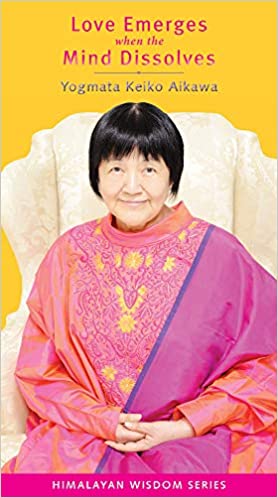Love Emerges When The Mind Dissolves
Yogmata Keiko Aikawa (Himalayan Wisdom, 2021)
An optimistic work about the benefits of a spiritual practice that not everyone will be able to achieve. Here
the Siddha master Yogmata-Ji asserts that through the hermetic practices of the Himalayan Wisdom Tradition
one may not just acquire true and lasting happiness and success in this life but ultimately dissolve into the
very heart of love. She guides the reader through the eight stages of Samadhi, revealing the secrets of mind
and body and of forms of Himalayan meditation that, evolved over five-thousand years of experimentation,
are designed to remove all existential weights, allowing practitioners to become as radiant as the sun—the
Anugraha ("divine grace"). Written in a clear and inspiring style, this practical guide includes a glossary of
Himalayan Wisdom Tradition terms and an easy-access system of sub headings.
Wapner’s role:
• publisher
Kirkus Review
A compassionate, no-frills guide to inner peace, rooted in the Anugraha Himalayan Samadhi program. In a
world where wellness and self-care have become marketing terms, renowned Siddha master, yoga pioneer,
and author Aikawa offers a less glamorous but more fulfilling alternative. As she puts it, this book “will introduce
you to a path that can’t be accessed in any other way, and which certainly can’t be bought with money.” This path
is related to the well-known “Eightfold Path” of Buddhism to achieve nirvana—the key to knowing one’s true self
and ascending to an existence free of suffering. The explanation of the eight practices makes up the core of the
book and is meant to guide one through decisions in day-to-day life, including “the right way to see and think” and
the “right mental concentration. What is “right” is directly tied to Aikawa’s practice with the Anugraha Himalayan
Samadhi program; as the world’s first female Siddha master, Aikawa asserts that she’s achieved samadhi, which
she describes as “the ultimate consciousness” of enlightenment. In less than 200 pages, she conveys a version
of her spiritual journey that may be attainable for readers who feel burdened by obligations and “obsessions,”
be they professional, personal, or materialistic. Aikawa offers insight into her own journey, as well, from her first
foray toward yoga and meditation after she was diagnosed with tuberculosis to meeting the Siddha master Pilot
Babaji, who invited her to study in the Himalayas. Some insights may surprise readers, such as her assertion that
“real meditation awakens you rather than making you drowsy…your awareness and understanding increase.”
Overall, the recommendations Aikawa offers don’t require a big budget, but they do require ample time and leisure—
a lifestyle that’s not accessible to everyone. The opening chapters, detailing what samadhi is and how the world has
conditioned people for suffering, are compelling. But, as Aikawa admits, they’re repetitive—and sometimes discouraging,
as most readers won’t have the author’s freedom to commit to the practice. An optimistic work about the benefits of a
spiritual practice that not everyone will be able to achieve.
